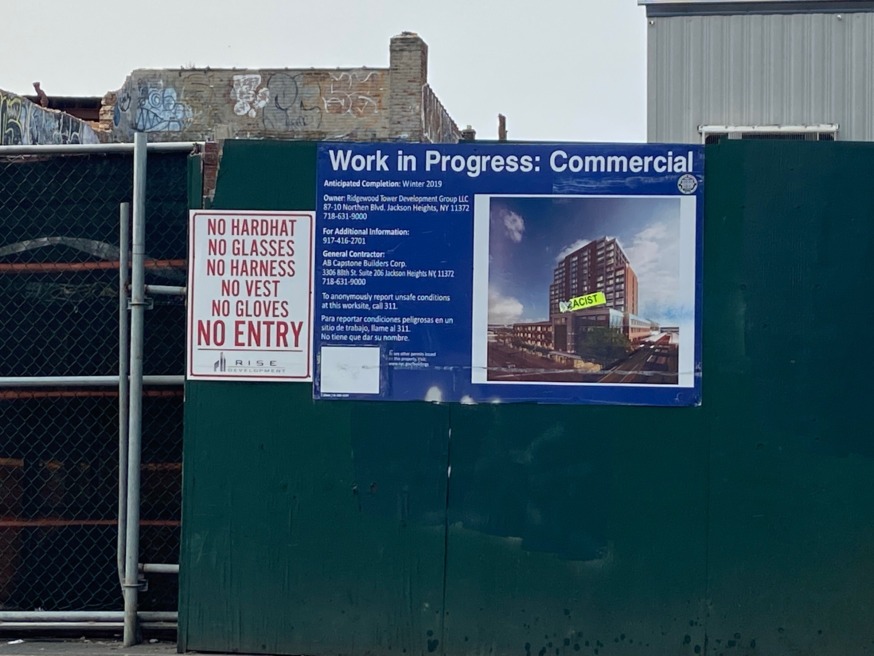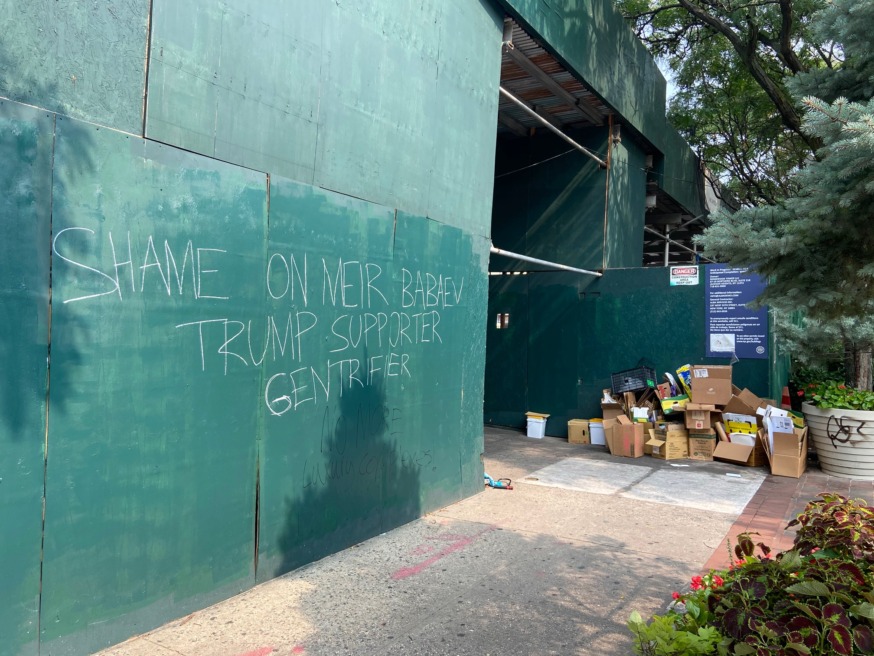
The development site at 3-50 St. Nicholas Ave. (Photo: Queens Post)
Sept. 16, 2020 By Allie Griffin
A Queens civic group traveled to a developer’s Jamaica Estates home Sunday to protest a 17-story luxury tower he is building in Ridgewood.
Members the Ridgewood Tenants Union, a local anti-gentrification and tenants right group, protested outside the upscale home of Meir Babaev, president of AB Capstone, at around 5:30 a.m. The protesters aim was to wake him up and let him know their displeasure.
The group opposes the mixed-use building AB Capstone plans to build “as of right” on a triangular lot bordered by Myrtle Avenue, Palmetto Street, Woodbine Street and St. Nicholas Avenue. They say the luxury building, which includes a mix of retail space and residential apartments, would drive up rents in Ridgewood and displace working class residents.
“Working class tenants and tenants of color are alarmed by the harm this project will cause as luxury development drives up rents in a neighborhood where they are already struggling and they are outraged at the total disregard Babaev has shown the Ridgewood community,” the Ridgewood Tenants Union said in a statement.
The tenants union led an 11-car caravan that circled Babaev’s block four times as drivers honked their horns and passengers banged on pots and pans. One organizer yelled into a megaphone, pleading with Babaev to come out to talk with them, video shows.
This morning we went to the home of Meir Babaev. He lives in Jamaica Estates, just 15 minutes from where Trump was raised. Just like Trump, Meir also believes that “blue lives matter” as demonstrated in the signs we found one day in his construction site’s scaffolding. pic.twitter.com/HqG4GLui8E
— Ridgewood Tenants Union (@RidgewdTenantsU) September 14, 2020
The organizers said the developer has refused to meet with them despite repeated requests since 2015, when the building was first proposed.
The Ridgewood Tenants Union said their protest woke up the developer’s wife who came to the door and yelled that he didn’t live there.
Their protest also woke up neighbors who were upset by the noise, according to the group.
“Why should he and his neighbors get rest when Meir Babaev is causing our community to lose our sleep and our homes over the displacement his project will bring?” said Bonnie Gil, a leader with the Ridgewood Tenants Union.
The plans for the building, dubbed the “Ridgewood Tower,” was approved by the Department of Buildings on Aug. 14, according to building records.
The building will have 138 apartments, a roofdeck and gym, 341 parking spaces and more than 96,000 square feet of commercial space. The developer isn’t required to provide affordable housing units in the building, since the building is as-of-right within the area’s zoning code.
The 207-foot tower at 3-50 St. Nicholas Ave. will become the tallest building in Ridgewood once built.
The Ridgewood Tenants Union also condemned the scaffolding around the construction site. They said it’s unsafe in that it forces pedestrians to walk into the street.
The group also called out AB Capstone for placing “All lives matter” and “Blue lives matter” signs on the construction scaffolding facade.
The Ridgewood Tenants Union is now leading a campaign asking Ridgewood residents to flood the email inboxes of Babaev and his property manager to demand that they hear their demands on the Ridgewood Tower.
Babaev didn’t return a request for comment.

The development site at 3-50 St. Nicholas Ave. (Photo: Queens Post)




